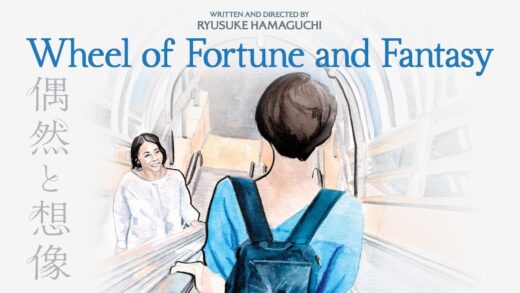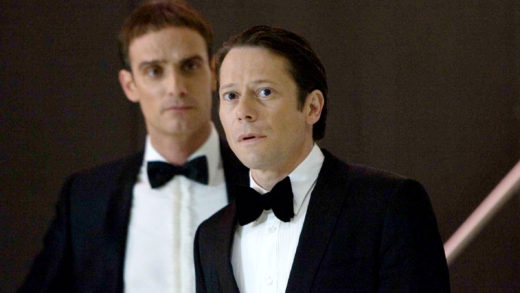Forbidden Games (1952), originally entitled Jeux Interdits, was directed by René Clément and stars two child actors, Georges Poujouly and Brigitte Fossey. The children meet when Paulette’s family is killed while fleeing Paris in 1940. Paulette is taken in by Michel’s family. With Michel, Paulette slowly constructs a cemetery for her dead puppy and other animals. But the children steal the crosses for their cemetery from the local cemetery, which causes much neighborhood strife.
Films that feature children in the roles the principal characters seem to suffer from a unique problem, in that one does not know how seriously to appreciate the actions of the protagonists. Being children, what is it that we can expect from them? Can we expect these children to narrate a story that is meaningful—that is not just “kid stuff”?
That this is even a question underlines how we are so radically alienated from ourselves as we grow beyond childhood, young adulthood, middle age, etc.
One of the lessons of the German Idealist philosopher G.W.F. Hegel‘s early work Phenomenology of Spirit is that all of our attempts to achieve some sure footing and certainty in our knowledge is bound to failure. At each moment we learn again that we have failed to know some crucial element about ourselves. We learn that our knowledge is actually ignorance.
To take that lesson to heart would mean to give an ear to the testimony of children, as much as it would to deny our self-certainty in the present. But our culture shows that neither of these is desirable.
In Forbidden Games Brigitte’s misery and loss is uniquely plain without being maudlin. Her parents have been killed as they’ve fled Paris in a long caravan of people trying to escape the Nazis. She is left with her dog, but it turns out that the dog has been killed as well. The rush and haste of those escaping means no one really attends to this very young girl—she’s barely five.
The viewer doesn’t know what’s going to happen to her, but she seems to follow a horse that is dragging a cart missing a wheel. The deaths of her parents have occurred in the first few minutes, so the viewer has had no time to develop any special affection for her or her parents. They are merely people killed, and Brigitte is simply an orphan.
The unfeeling of the viewer is mirrored by the line of escaping people and cars and horse-drawn carts.
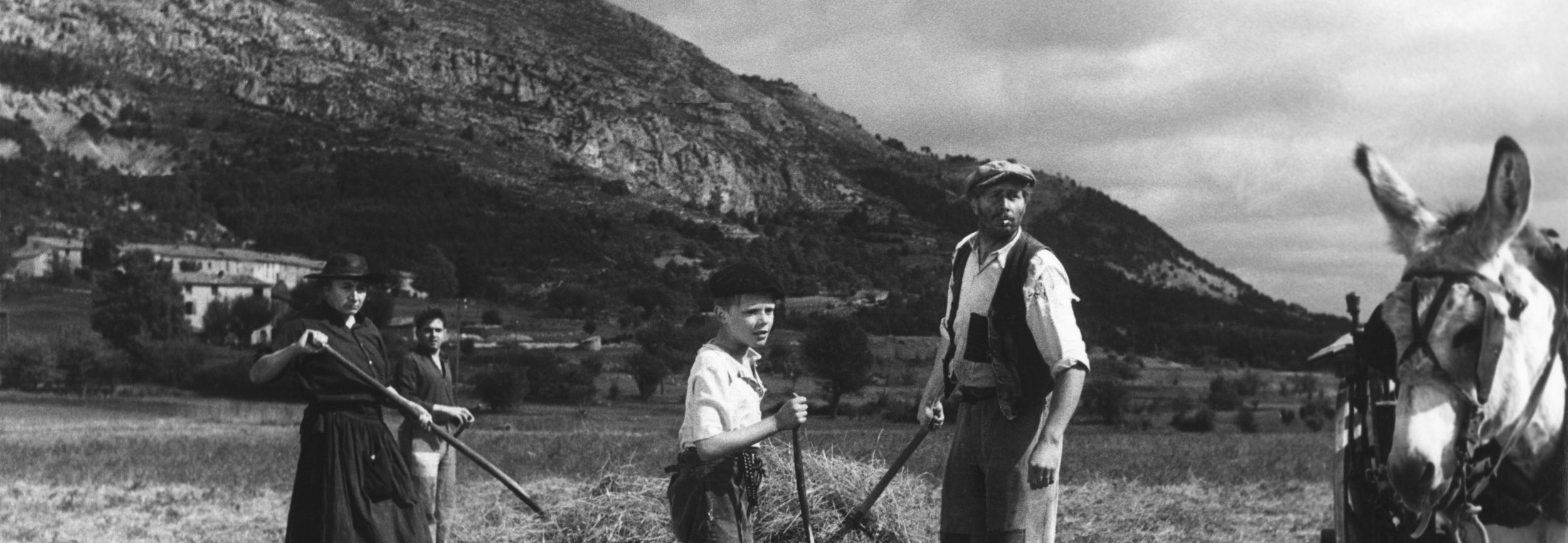
Amidst this, Brigitte is carrying her dead puppy and follows the errant horse into a field where she encounters the family we will come to know as Michel’s. But before anything can happen, Michel’s much older brother will try to stop the horse and be kicked by it.
Michel encounters Brigitte in the field and tells her to stop carrying the puppy. She immediately puts down the puppy, even though doing justice to the puppy is her totem for burying her parents. Michel takes her to his parents and insist that they take care of her, which his father reluctantly does.
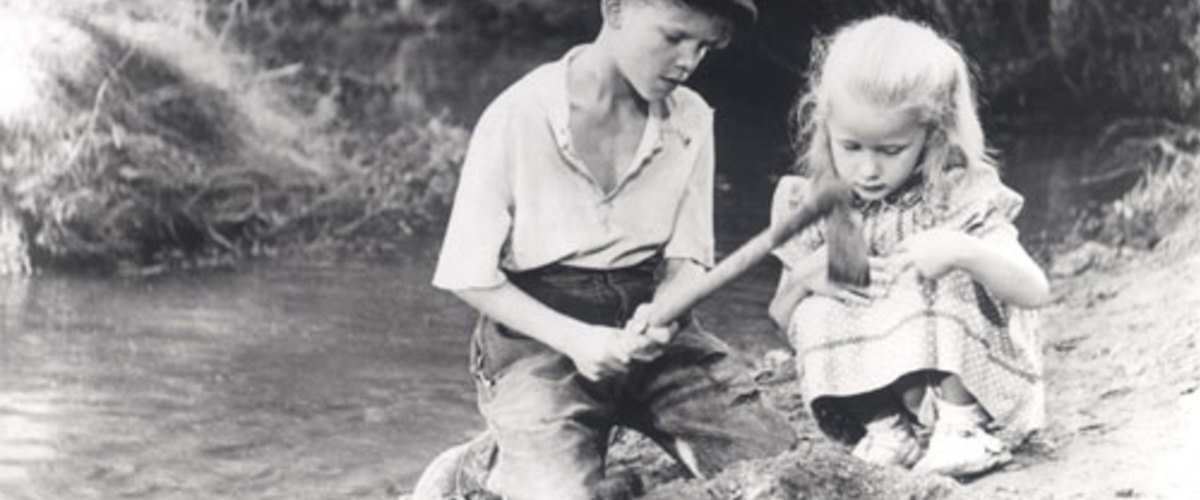
It is only later that Brigitte and Michel return and then find a place to bury the puppy. But burying the puppy does not complete the action.
So as to allow the dead puppy community, they bury other dead animals around it and begin an activity that will exhaust much of the film: the cultivation of a cemetery for these lost animals replete with the signs of recognition and dignity owed to the dead.
As it turns out Brigitte is wholly ignorant, to the horror of some of her adopted family, of the Christian rituals in observing a person’s mortality. Despite his upbringing outside cosmopolitan Paris (or because of it), Michel is well learned in the catechism and Christianity more generally. So he is the one that suggests they find crosses to put on each of the graves.
The cemetery is wholly a secret between Michel and Brigitte. Neither of Michel’s parents nor his siblings know of the existence of the cemetery, which had been created inside part of a defunct mill. Neither do they know that Michel and Brigitte are seeking crosses to mark the graves in their cemetery.
This particular feature of their ritual—finding crosses to mark the graves— becomes obsessive: in it is the core of the film.
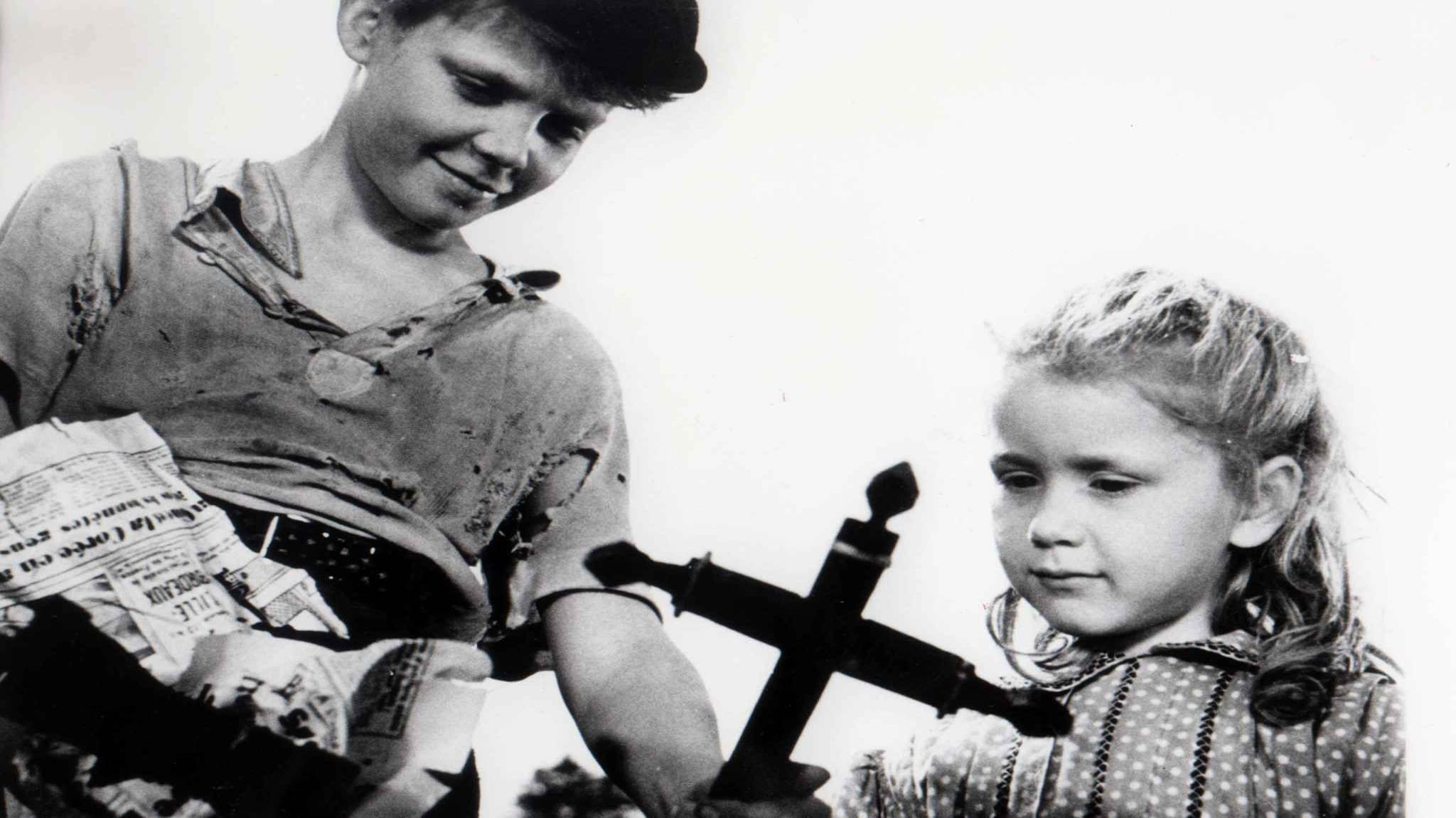
The cemetery’s many meanings
This animal cemetery is so important to Forbidden Games because it bears at least three if not more distinct meanings.
First, for Brigitte the cemetery for the animals is a way of observing and mourning her own parents. In the unfolding of the narrative, Brigitte was left no time to stay with her parents and see what would happen to their bodies.
At one point in conversation with Michel, he happens to indicate that the bodies of humans should be treated with more reverence than those of animals. This is a problem because Brigitte has no way to perform this ritual for her parents. Thus, in burying her puppy she obtains some recognition for her parents.
Second, for Michel the cemetery allows him respite from the physical abuse frequently visited upon him by his father. The cemetery is a place where he and Brigitte are free from the judgment of parents and where Michel’s own actions accord him the dignity that he fails to get in his crowded home, where is is the fifth and youngest of several children. His siblings are adults or near adults. He is the only child and the only one that the father can excessively discipline. The others are too old.
Third, the children obsess in finding recognition for these animals. That this activity is a secret is part of what makes it so important for them. We might even be tempted to observe that only children can bear such resolute and innocuous attention to the plight of animals … not even humans.
The economy of feeling
But this attention has a cost.
In attending to the dignity of these animals, the significance of the lives of the humans around them means less. Brigitte seems to have forgotten about her parents. Michel, so consumed with this activity, seems less concerned when his oldest brother dies.
This brother had been kicked by a horse. His ill health was the other event occupying the time when Brigitte arrives. It is not clear how badly he has been injured and Brigitte’s arrival seems to distract from that gravity.
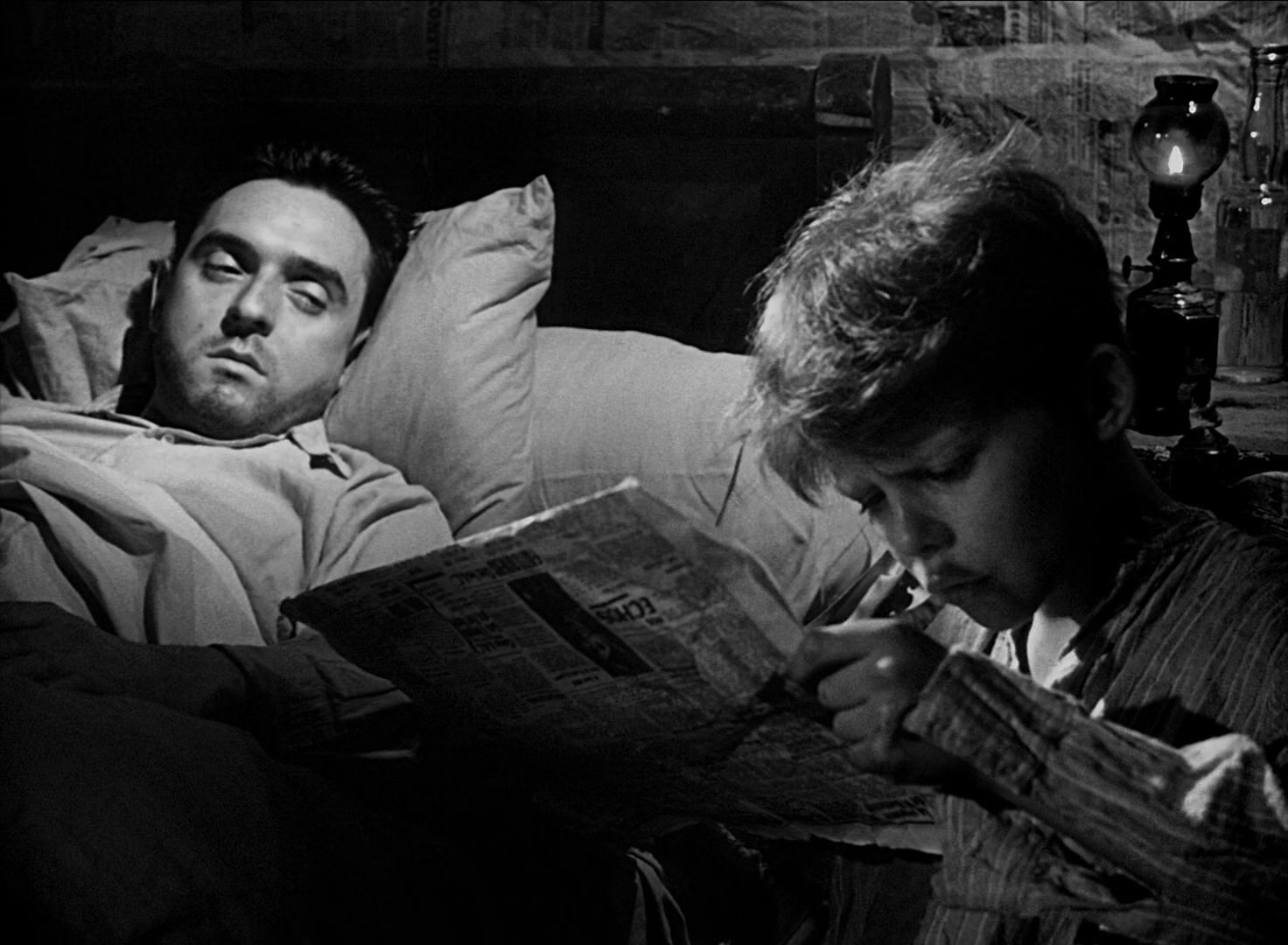
When the brother dies, no one is even certain that he is dead.
That uncertainty is by itself shocking today: how many times have we watched on television or in movies the event of a person being pronounced dead? If there is anything modern viewers know, it is when people are dead. Whereas, in Forbidden Games Michel’s family lives without even a radio.
This uncertainty prolongs his death, but it does not make the event more solemn. The parents and siblings are upset, but the brother’s death is also an event that simply occurs on a farm. Arguably, it is even part of the reason why such large families were necessary. Each child was a cog in the machinery of the family’s well-being.
But the family still does what it can to give the brother a proper burial, including employing a special hearse-like cart built for carrying bodies to their final resting place. In repairing it with his father, Michel notices the numerous crosses adorning the top.
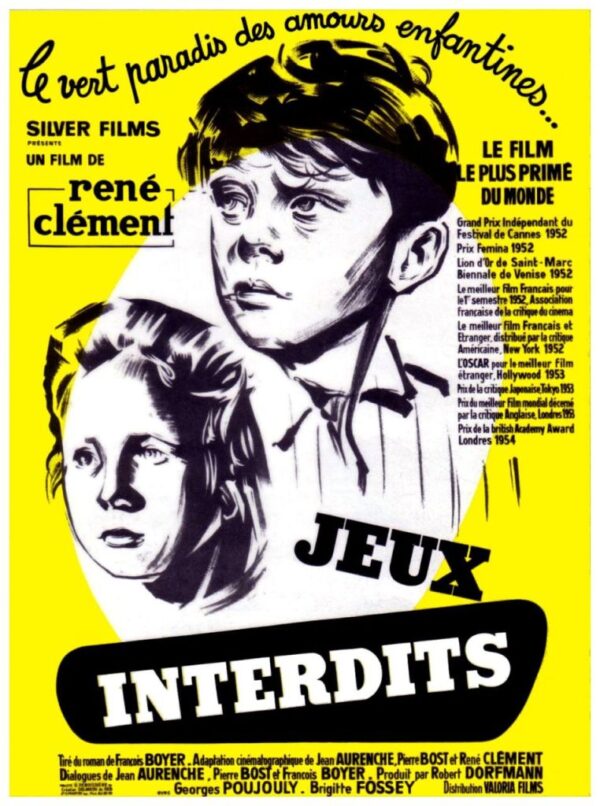
Not long after the brother has been buried, his grave is discovered without the cross the impoverished family had purchased for it. In fact, not only this cross, but so many of the crosses in the local cemetery, on the hearse, and even in the chapel were the target of Michel’s efforts.
The result is a lovely monument to the animals that Brigitte and Michel seek to recognize. In fact, no animal is unworthy of their efforts (at one moment Michel kills a beetle in front of Brigitte, to her horror, for the sake of adding to the cemetery).
The crisis
When Michel’s father learns the cross is missing from the brother’s grave, his deep jealously of the neighboring family leads to a fistfight with the patriarch in which both fathers inadvertently fall into an open grave, yet they continue to fight.
So to be clear, Michel—and Brigitte as a less active but still able conspirer—has desecrated his brother’s own grave for the sake of honoring the graves of animals. The act of honor and recognition is at the same time a feat of indifference.
Of course, it’s not really the case that these children are indifferent to the deaths around them. To the contrary, they process these losses trough a manageable substitute.
Brigitte loses her parents, but she gains a brother. Michel gains a sister as he

